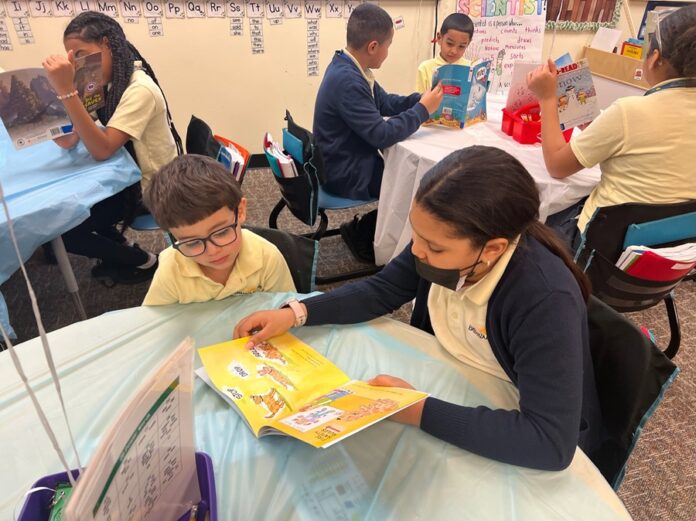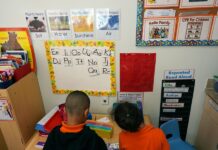Early Literacy Strategies at Esperanza Academy
At Esperanza Academy Elementary, we believe that building a strong foundation of reading skills is vital for a child’s immediate and future success. According to a report from the Annie E. Casey Foundation entitled “EARLY WARNING! Why Reading by the End of Third Grade Matters,” “Reading proficiently by the end of third grade … can be a make-or-break benchmark in a child’s educational development,” and “low achievement in reading has important long-term consequences.” To ensure that our students have the tools they need to learn and grow, we provide individualized instruction to help move them forward, foster a celebratory culture to cheer them on along the way, and partner with parents and guardians as they support their child’s learning at home.
All students are tested at the beginning of the school year using the Independent Reading Level Assessment® (IRLA®) from the American Reading Company to determine their baseline reading level. Using that leveling, parents are provided with specific “Power Goals” that clearly show them which skills their child needs to master to reach the next reading level. Teachers regularly meet with their students, either in small groups or individually, to coach them through those specific skills. Students are re-tested throughout the school year as their teacher sees their skills grow.
Daily reading instruction for grades K-2 is focused on phonics, phonological awareness, and comprehension. In addition to 30 minutes of instruction using the Foundations Curriculum each day, students spend additional time engaged in literacy activities that provide more practice of the skills learned during instruction time. Unit assessments provide teachers with data that helps them identify what skills students need to grow. When students reach third grade, the instructional focus shifts from learning to read to reading to learn. Students are exposed to a wide range of reading and writing skills such as research, literary genres, and writing to express opinions.
Following the idea that practice makes perfect, students are required to read for 30 minutes at school and 30 minutes at home every day. As they learn and grow through classroom instruction, literacy activities, daily reading time, and access to other resources, we get to see our students continue to advance in their reading levels; we love to cheer them on and see their excitement! To celebrate their achievement, students get to visit the office to ring a special bell, be applauded by staff, and receive a pin for their new level to display on their school lanyard.
While a strong literacy program at school is vital in a child’s academic journey, the support that parents and guardians provide at home is invaluable. We asked our K-2 Literacy Curriculum Specialist, Sasha Castillo, to share some tips for how parents and guardians can help their children grow their reading skills in everyday life:
- Read together every day. You can read the morning news at breakfast, share a story after dinner, or cuddle up for a book at bedtime. A daily reading routine is something everyone can look forward to.
- Talk and build vocabulary. Interesting conversations build vocabulary, language skills, and knowledge about the world. Conversation is a child’s best source of exposure to new words and ideas.
- Point out print. Read and talk about the words you see in the world around you. There’s lots to read—signs, recipes, cereal boxes, instruction manuals, bus schedules, news, maps, and menus.
- Create a reading-rich home. Find books at the bookstore or yard sales. Provide a special shelf or basket for kids to keep their own books and one for library books. Make sure there are quiet, comfortable places to read.
- Ask questions when you read. Ask your child to guess what comes next. Ask open-ended questions that help them relate to characters or events in the book. Let your child get involved and ask questions too–interruptions are okay!







